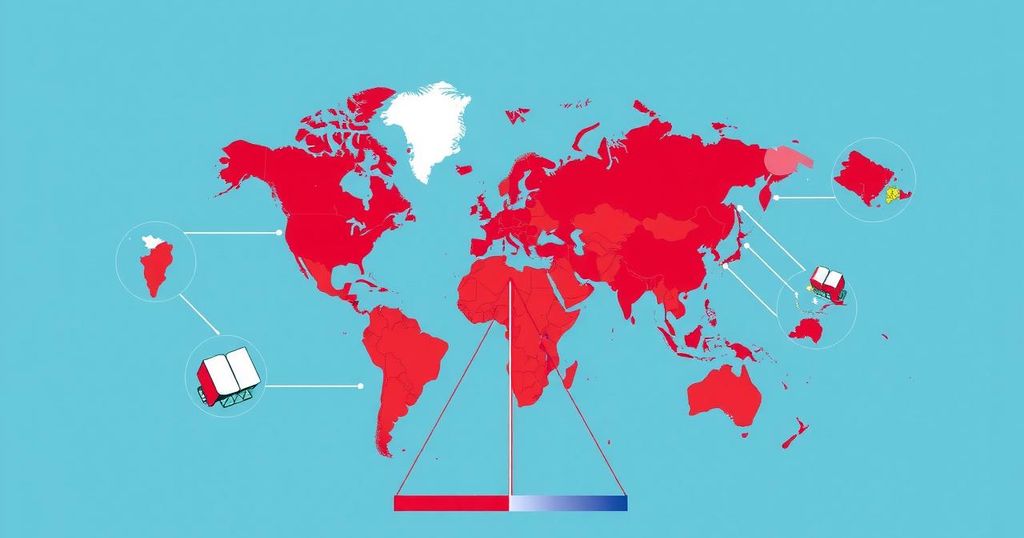The year 2024 saw unprecedented global electoral participation and political transformations. Significant outcomes included Donald Trump’s reelection in the US, Modi’s coalition government in India, political unrest in France and Germany, as well as shifts in Latin American leadership. These developments reflect rising populist sentiments and will have long-lasting geopolitical implications.
The year 2024 witnessed a remarkable surge in democratic engagement, with approximately 4 billion individuals around the globe participating in various elections. Notably, several ruling parties faced erosion of support due to allegations of corruption and democratic decline, particularly in nations such as South Africa and India. Concurrently, a notable pivot toward far-right ideologies was evident in European states, while the political landscape in the United States was marked by the return of Donald Trump to office following a significant electoral victory. As analysts assess the ramifications of these elections, it is clear that they will indelibly influence international geopolitics for years to come.
In the U.S., Donald Trump’s successful reelection on November 5 came as a surprise to many, particularly after the controversies surrounding his previous term and legal challenges. Trump’s campaign strategy capitalized on economic discontent and rising anti-immigration sentiments, leading to a convincing victory in both the popular and electoral college votes. The Republican Party, having gained narrow control over Congress, is now poised to advance Trump’s agenda. According to Semafor’s political analyst Dave Weigel, the results suggested that Republicans have effectively appealed to non-college educated demographics who previously aligned with Democrats.
Over in Asia, Prime Minister Narendra Modi’s Hindu nationalist party faced unexpected setbacks in India, resulting in a coalition government. Observers viewed this as a positive sign for democracy amid Modi’s authoritarian criticisms. Challenges may loom for Modi’s ambitious policy initiatives, particularly those affecting minority rights. Meanwhile, in Indonesia, Prabowo Subianto’s controversial election was marred by allegations of voter irregularities, potentially shifting the nation’s foreign relations closer to China, challenging incoming President Trump’s strategies.
France’s political situation escalated into chaos following President Emmanuel Macron’s snap election call. Resulting in a fragmented parliament, the inability to establish a stable government has raised concerns regarding European security amidst rising anti-immigrant sentiments. The subsequent instability in both France and Germany, Europe’s leading economies, poses significant challenges for addressing ongoing issues, such as support for Ukraine.
In the UK, the Labour Party’s landslide victory disrupted 14 years of Conservative governance amid one of the lowest voter turnouts. Despite the shift, Prime Minister Keir Starmer has faced widespread public dissatisfaction, complicating efforts to address pressing social issues. In Latin America, Mexico witnessed the election of Claudia Sheinbaum as its first female president, continuing López Obrador’s policies, while Venezuela’s elections raised international scrutiny as Nicolás Maduro claimed dubious victory amid protests.
South Africa’s African National Congress faced unprecedented challenges after losing its parliamentary majority, resulting in a coalition government. Although there have been improvements in daily governance, President Cyril Ramaphosa has acknowledged the lingering societal issues of poverty and unemployment. As 2024 draws to a close, the myriad political landscapes observed globally will undoubtedly resonate within international relations for many years to come.
The examination of the global elections of 2024 provides crucial insights into shifting political dynamics that not only affect domestic governance but also influence international relations. Key elections in pivotal nations such as the United States, India, and major European countries have resulted in significant policy shifts and rising political movements, including the resurgence of nationalism and far-right ideologies. These elections reflect a complex interplay of public sentiment, economic conditions, and responses to governance styles amidst accusations of corruption and authoritarianism, making their implications vital for future geopolitical trends.
In summary, the elections of 2024 have illustrated a pivotal moment in global governance marked by significant political transformations across various nations. The reelection of Donald Trump, the unexpected challenges faced by Modi in India, and the political upheavals in major European states exemplify a shift towards alternative political ideologies and power structures. Additionally, the emergence of new leadership in Mexico and the instability in South Africa signal broader trends that will shape international politics and relations in the aftermath of these elections.
Original Source: www.semafor.com






